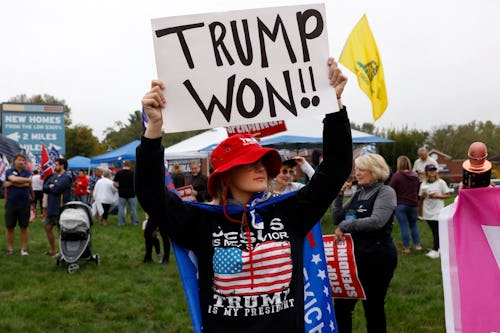
At this point it’s basically passé to point out that former President Donald Trump absolutely did his damndest to overturn his 2020 electoral loss. Even if he hadn’t incited a horde of his most enthusiastically violent, unhinged red-hats to breach the U.S. Capitol and lynch the vice president in a transparent putsch attempt, he still spent the months leading up to President Biden’s inauguration — and has spent the months since — making little secret of his intent to audit, recount, sue, and generally insist (wrongly) that he won the White House. It’s the centerpiece of just about every fundraising email, TV interview, and public appearance Trump has made for the past year or so.
Nevertheless, here in the United States we like our politics BIG and OBVIOUS, which explains why the Senate Judiciary Committee titled their just-released report on Trump’s multi-pronged effort to flip his 2020 electoral loss “Subverting JUSTICE” (bold and italics theirs). It’s a broad, wholly unsubtle frame for nearly 400 pages of damning evidence that shows — in many cases for the first time to the general public — just how much Trump actually did, behind the scenes, to retain his presidency in the face of an overwhelming electoral walloping.
The report, released Thursday morning by Senate Democrats, focuses particularly on the Trump administration’s attempt to involve the Department of Justice in the broader effort to overturn the election results. Over the course of an eight-month investigation, committee members uncovered multiple instances of Trump, his chief of staff Mark Meadows, and DOJ attorney Jeffrey Clark, among others, working to actively marshal the Justice Department in the service of the president’s ego-driven refusal to accept his loss. Among the chief findings from the report are nine instances of Trump personally raising election fraud claims with DOJ officials. In one particularly chilling instance, investigators concluded that:
Trump forced the resignation of U.S. Attorney Byung Jin (“BJay”) Pak, whom he believed was not doing enough to address false claims of election fraud in Georgia. Trump then went outside the line of succession when naming an acting U.S. attorney, bypassing First Assistant U.S. Attorney Kurt Erskine and instead appointing Bobby Christine because he believed Christine would “do something” about his election fraud claims.
Speaking with CNN’s New Day, Senate Judiciary Committee Chairman Dick Durbin of Illinois drew a distinct line between his committee’s findings and Trump’s overall effort to stage what effectively amounted to an attempted coup.
“First phase, Trump goes to court. Loses every lawsuit, which claims there was voter fraud in the election,” Durbin explained. “Next, he decides he has to take over the Department of Justice and the attorney general, and have the attorney general push this narrative on to the states to tell them to stop from sending in their Electoral College vote totals.”
“When that failed — and our report goes into graphic detail of the efforts that were made — the third step was to turn the mob loose on the Capitol the day we were counting the ballots,” he concluded.
Thursday’s report is separate from, but seemingly dovetails with, the work being done by House Democrats to investigate the origins and events of the Jan. 6 insurrection attempt. That investigation is currently being stymied by a number of Trump associates — including Meadows — who have reportedly been instructed by Trump himself to simply not comply with congressional subpoenas issued by the committee.
Alarming as that may be, equally alarming is the Republican rebuttal to the Senate committee’s report. Iowa Sen. Chuck Grassley, the Senate Judiciary Committee’s ranking member, released a response Thursday that essentially validates much of the Trumpian underpinnings that led to the insurrection attempt. That supplementary report largely accepts at face value that Trump was simply curious about instances of “legitimate complaints,” and was merely acting on the advice of team. If nothing else, it’s a sign of the degree to which Trump’s effort to call into question his electoral loss has been incorporated and disseminated throughout the GOP as a whole.
In other words: Even if the Senate committee’s report offers clear and striking evidence of how Trump worked actively to overturn his electoral defeat, it’s hard to see Congress actually doing anything about it anytime soon.







